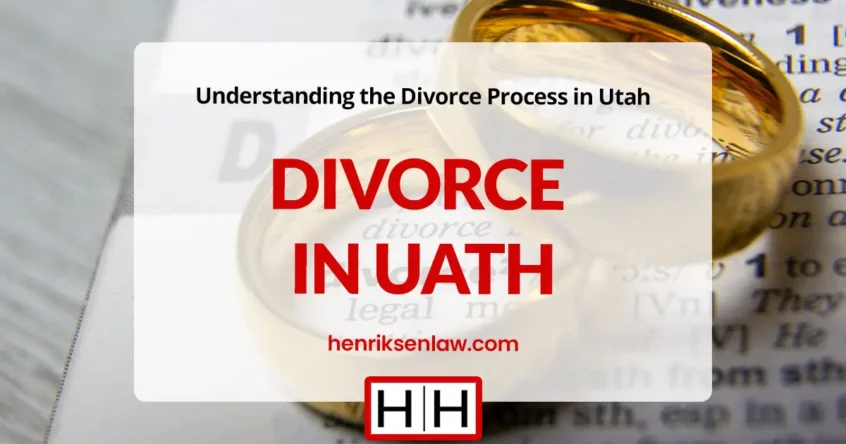What is the Divorce Process in Utah?

Divorce is never easy. Besides being emotional, the legal process also can be overwhelming. Although divorce isn’t something couples dream of, many face this harsh reality at some point. As one of the leading divorce lawyers in Utah, we have seen even long-running marriages coming to an abrupt end. According to the CDC, in 2021, 689,308 divorces occurred across the U.S. (45 reporting States and D.C.). There is no data for the remaining states, which means the actual number could be much higher.
Whether you’re contemplating a divorce or have already made a difficult decision, understanding the divorce process in Utah is crucial. Usually, there are four distinct factors:
- Understanding Utah’s divorce laws
- Filing for divorce (or how to file for divorce)
- Attending education classes and mediation
- Going to trial
Let’s take a look at them one by one.
Understanding Utah’s Divorce Laws
Utah’s divorce laws are fair and just. However, you need to be aware of the specifics. In Utah, a divorce can be granted based on irreconcilable differences or when one party gets deemed at fault, such as in cases of adultery, abandonment, or cruelty. Of course, you will need to consult competent divorce lawyers in Utah. They can tell you more about what you need, depending on the analysis of your case.
But here are a few critical facts you need to know.
- Child Custody and Support: Child custody and support arrangements are often the most emotionally charged aspects of a divorce. Utah prioritizes the best interests of the child when making these decisions. Working closely with knowledgeable divorce lawyers in Utah ensures your child’s well-being remains front and center.
- Residency Requirements: Utah has residency requirements for divorce. You or your spouse must be a resident of the state for at least three months before you file for divorce online or offline. Establishing residency is vital to ensure your case falls within Utah’s jurisdiction.
- Division of Assets and Alimony: Utah follows an equitable distribution system for dividing marital property. The divorce laws in Utah aim for a fair, though not necessarily equal, split. The court or judge may award alimony or spousal support based on factors like the length of the marriage, financial disparities, and the recipient’s needs.
- 90-Day Waiting Period: You will have to wait 90 days after filing the petition to get the final divorce order signed by the judge. So, even if it is an uncontested divorce, it will be three months before the final agreement gets signed.
How to File for Divorce
The divorce process in Utah involves several key steps. First, familiarize yourself with your county’s specific requirements. Typically, the process starts with filing a Petition for Divorce and ends when you sign the final decree of the divorce. Hiring seasoned divorce lawyers in Utah can streamline this process.
But, you should know about:
- Filing the Divorce Petition: You will need to file a petition to initiate the divorce process. The petition outlines details, including grounds for divorce, child custody (if applicable), and asset division. Consulting divorce lawyers in Utah early in this process ensures accuracy.
- Serving the Divorce Papers: When you file the petition, you must serve the divorce papers to your soon-to-be ex. This step involves delivering copies of the petition and a summons to inform your spouse of their rights and obligations. Divorce lawyers in Utah can assist in this process, ensuring it adheres to legal requirements.
- Wait for the Response: Upon receiving the divorce papers, your spouse has 21 to 30 days to respond, depending on if they live in Utah (21 days) or outside the beehive state (30 days). Your spouse will either agree to or contest the terms outlined in the petition. If your spouse contests it, your divorce lawyers in Utah will facilitate negotiations or represent you in court.
Attending Education Classes and Mediation
The trial won’t commence immediately after you file for divorce. There are two critical steps you and your souse will have to go through, education classes and mediation.
- Education Classes: Utah law mandates parents with minor children going through divorce attend a divorce education class. It helps parents understand the emotional and psychological challenges children face during divorce. You can take it online or offline. There is also a divorce orientation class. It covers alternatives to divorce.
- Negotiation and Mediation: Most divorce cases in Utah get settled through negotiation or mediation. Your divorce attorney in Utah will also try to do the same while ensuring fair agreements on child custody, alimony, and asset division. Mediation allows couples to resolve disputes with the help of a neutral third party. It aims for an amicable resolution.
- Temporary Order: You can get a temporary court order for things like who gets child custody. These orders are often valid until the divorce gets finalized. You can use it for emergencies, such as domestic or child abuse. Both you or your spouse can request the court to grant a temporary order.
Going to Trial
Although most divorces end up in a settlement, a few will go to trial. If that happens, your divorce attorney in Utah prepare for the trial.
- Court Proceedings: When negotiations fail, the case proceeds to court. Each party presents their case, and a judge decides on unresolved matters. Your attorney will also present your side of the story. They will present relevant evidence and witnesses. You will need to attend the trial proceedings without fail.
- Divorce Finalization: After considering arguments by both parties and examining the evidence, the judge will sign the final divorce decree. Once the court issues a divorce decree, the marriage is legally dissolved.
Conclusion
Divorce is undoubtedly challenging. However, understanding the divorce process in Utah empowers you to make informed decisions. It increases the chances of getting a favorable legal outcome. And, of course, you should also seek professional advice from knowledgeable and skilled divorce lawyers in Utah. Remember, informed, empowered decisions pave the way for a more stable post-divorce future. Hopefully, this post will help you understand the basics of the divorce process in Utah.
Are you contemplating a divorce? At Henriksen & Henriksen, our seasoned divorce lawyers can help you get through this challenging task. Reach us at (801) 521-4145 or fill out our online form to schedule a free consultation.
